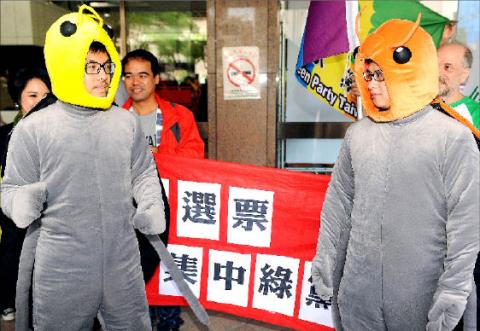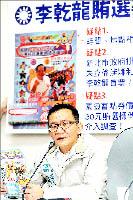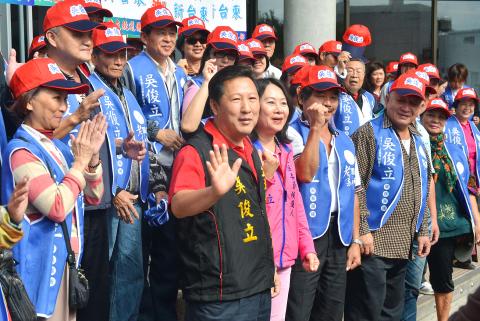A total of 412 legislative candidates have registered with the election authorities for the Jan. 14 presidential and legislative elections, the Central Election Commission (CEC) said yesterday.
According to a notice published by the commission, a total of 79 legislators will be directly elected to the 113-seat legislature, with six of the 79 seats reserved for Aboriginal constituencies. The other 34 seats will be apportioned based on a separate vote for political parties, it added.
The law stipulates that 34 of the legislature’s 113 seats are reserved for legislators-at-large and awarded to parties in proportion to the number of votes they receive in the legislative election. A political party must win at least 5 percent of the votes cast in the election to be eligible for a share of the at-large seats.

Photo: Chu Pei-hsiung, Taipei Times
Among the legislative candidates who registered with the commission on the last day of registration yesterday were the New Party and the Green Party Taiwan, which nominated six and two legislator-at-large candidates respectively.
The Chinese Nationalist Party (KMT) and the Democratic Progressive Party (DPP) have 34 and 33 nominees for legislator-at-large seats respectively, while the People First Party registered 18 and the Taiwan Solidarity Union registered 10.
Assessing the party’s electoral outlook, KMT officials yesterday said they expected the party to win over half the seats in the legislature, but it was still possible that its legislative majority would be small.

Photo: Fang Pin-chao, Taipei Times
In the current legislature, the KMT holds three-quarters of the 113 seats, while the DPP, which previously held 89 of the 225-seat legislature in 2004, has 32 seats.
DPP caucus whip Ker Chien-ming (柯建銘) yesterday estimated that the DPP would win at least 50 of the legislative seats, including 16 or 17 legislator-at-large seats, and at least 34 seats in the district elections.
The party continues to work toward winning 57 seats so that it has a legislative majority, he added.

Photo: Chu Pei-hsiung, Taipei Times
Additional reporting by Tseng Wei-chen

Photo: CNA

Taipei has once again made it to the top 100 in Oxford Economics’ Global Cities Index 2025 report, moving up five places from last year to 60. The annual index, which was published last month, evaluated 1,000 of the most populated metropolises based on five indices — economics, human capital, quality of life, environment and governance. New York maintained its top spot this year, placing first in the economics index thanks to the strength of its vibrant financial industry and economic stability. Taipei ranked 263rd in economics, 44th in human capital, 15th in quality of life, 284th for environment and 75th in governance,

Greenpeace yesterday said that it is to appeal a decision last month by the Taipei High Administrative Court to dismiss its 2021 lawsuit against the Ministry of Economic Affairs over “loose” regulations governing major corporate electricity consumers. The climate-related lawsuit — the first of its kind in Taiwan — sought to require the government to enforce higher green energy thresholds on major corporations to reduce emissions in light of climate change and an uptick in extreme weather. The suit, filed by Greenpeace East Asia, the Environmental Jurists Association and four individual plaintiffs, was dismissed on May 8 following four years of litigation. The

A former officer in China’s People’s Liberation Army (PLA) who witnessed the aftermath of the 1989 Tiananmen Square massacre has warned that Taiwan could face a similar fate if China attempts to unify the country by force. Li Xiaoming (李曉明), who was deployed to Beijing as a junior officer during the crackdown, said Taiwanese people should study the massacre carefully, because it offers a glimpse of what Beijing is willing to do to suppress dissent. “What happened in Tiananmen Square could happen in Taiwan too,” Li told CNA in a May 22 interview, ahead of the massacre’s 36th anniversary. “If Taiwanese students or

The New Taipei City Government would assist relatives of those killed or injured in last month’s car-ramming incident in Sansia District (三峽) to secure compensation, Mayor Hou You-yi (侯友宜) said yesterday, two days after the driver died in a hospital. “The city government will do its best to help the relatives of the car crash incident seek compensation,” Hou said. The mayor also said that the city’s Legal Affairs, Education and Social Welfare departments have established a joint mechanism to “provide coordinated assistance” to victims and their families. Three people were killed and 12 injured when a car plowed into schoolchildren and their